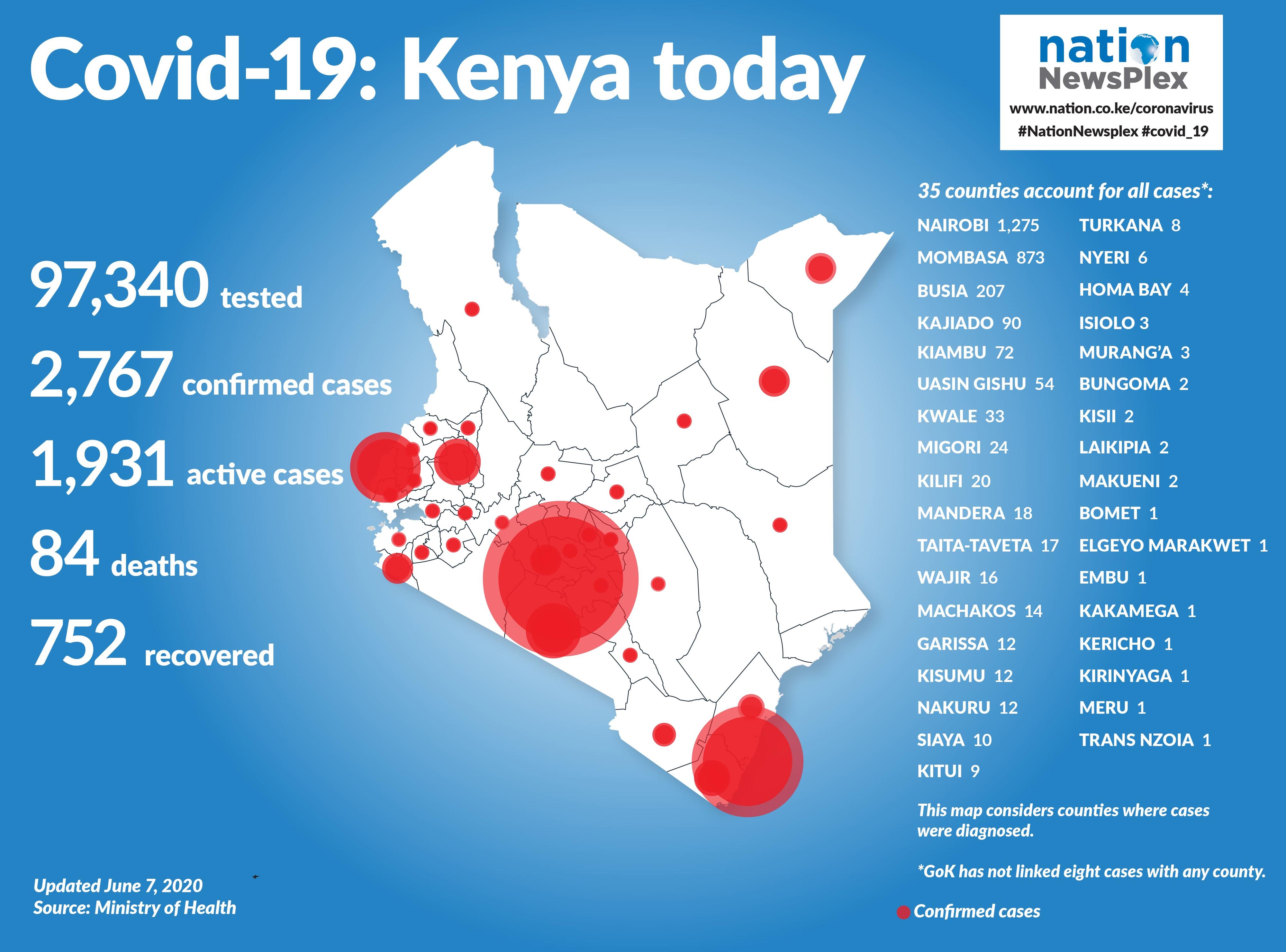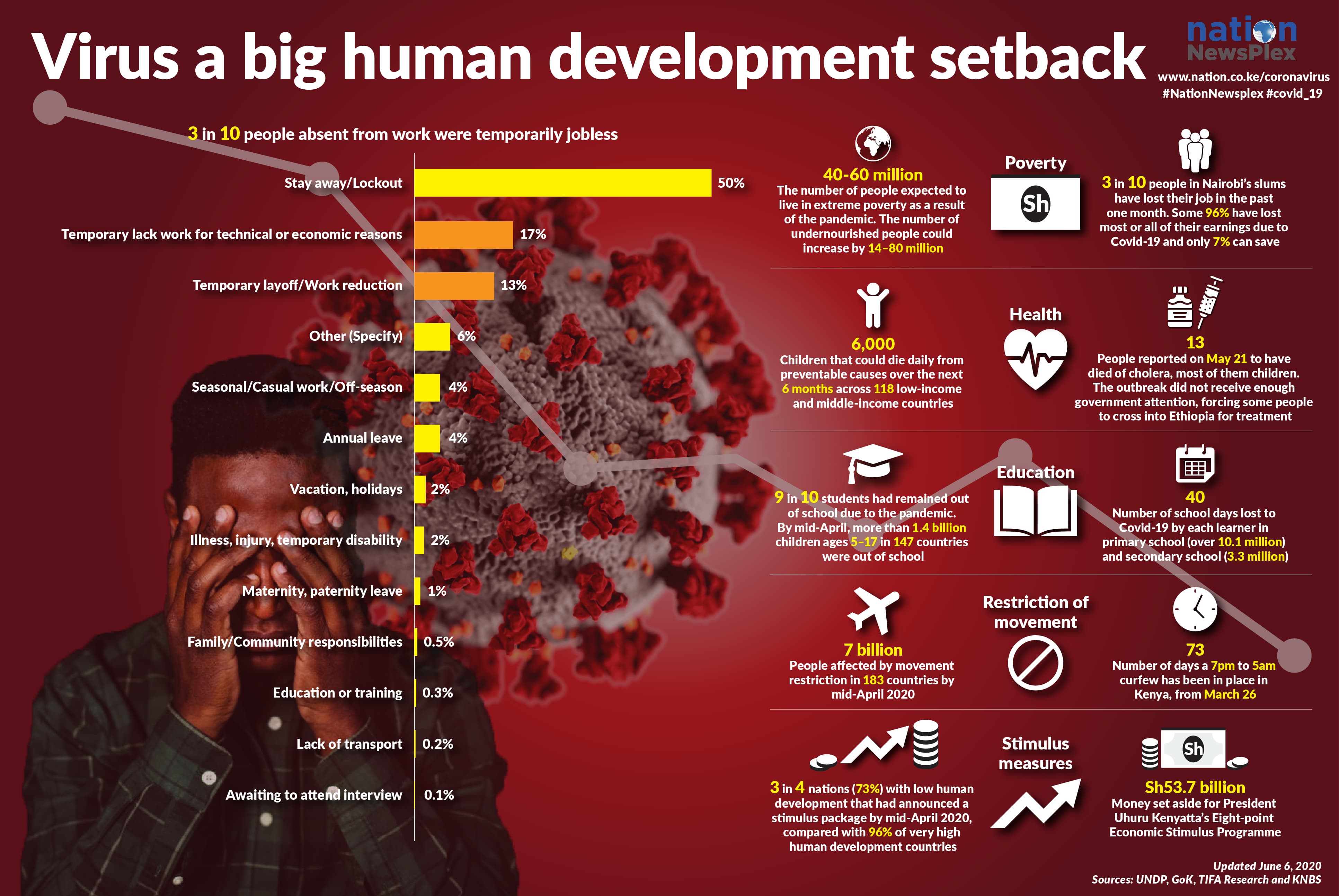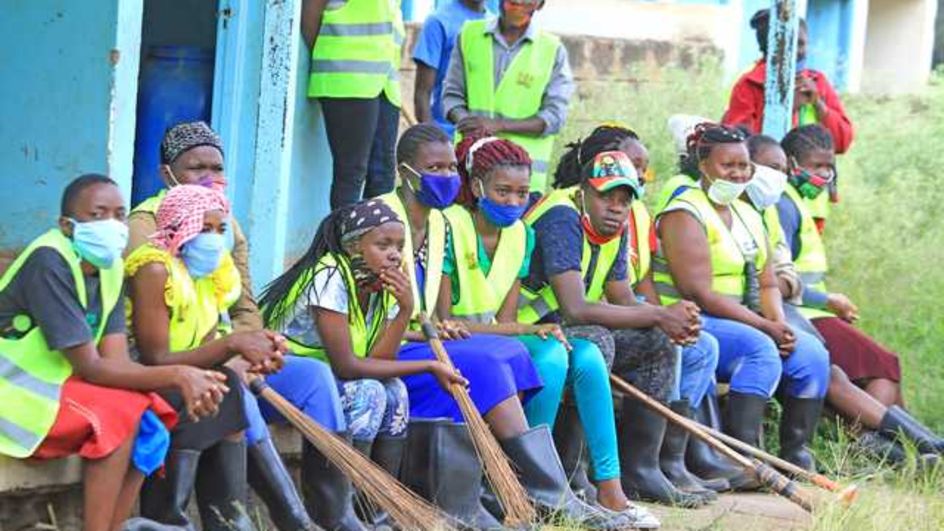AUTHORS
- BRIAN AMBANI (More by this Author)
- ALBERT MWAZIGHE (More by this Author)
Summary
- Thousands of Kenyans who have lost their jobs and are counting on the stimulus package to revive the economy.
- The National Treasury has indicated that the 2020/21 budget is aimed at prioritising employment creation, youth empowerment, supporting manufacturing activities, enhancing health coverage, improving food security and enhancing living conditions through affordable housing.
When Covid-19 disease was first announced in Kenya in March, Ms Joan Ndangwa who works in fickle hospitality industry at a city hotel did not expect the consequences to be as quick.
Like a bolt from the blue, a week later, her colleagues who were on a night shift were dismissed from work in the dead of the night at 12am.
“When the first case was announced in the country, the hotel management panicked. Just over a week later, an announcement was made that our guests should leave the hotel by 11pm and the staff to leave by 12am,” Ms Ndangwa narrates the events of that day.
Those who were not at work on that day, including her, got emails communicating the effect that the coronavirus had brought on the hotel necessitating laying off of staff.
“We received communication from the hotel that the current environment had immeasurably disrupted the business and that when the situation normalises, we would be recalled. We were then paid only for the 22 days we were at work that month,” she says.
Now, jobless, she is still trying to wrap her head around the fast-paced events of two months ago.
Even before Nairobi was locked down to prevent movement of non-essential persons, Ms Ndangwa was not planning to flee to her rural home in Makueni as many people had done.
The sudden job loss had caught her totally unawares and she was in a poor state financially.
Her co-workers, she says, now engage in menial jobs like hawking small wares to put food on the table while others are dabbling in online writing. Still, others, especially those who left for their rural areas before the lockdown have resorted to farming and are growing vegetables and rearing chicken to sell online.
PEOPLE ALSO READ:
- Youth Or Consequences: Put Youth At The Center Of COVID-19 Recovery
- Africa: How Urban Mobility Can Come Back Stronger In A Post-Pandemic World
- Development Policies Must Be Changed Because Of Covid-19
She has not been as lucky in finding an alternative source of income, barely getting by even as hope to be recalled to work grows dimmer with each passing day.
However, she is hoping to land a casual job in product promotion this coming week.
“This coming week, I will be seeking a product promotion job that will enable me to get through this tough period. Also, it will help me to gradually prepare myself financially so that I can be able to start my own business by next year,” Ms Ndangwa says.
Her story can be shared by hundreds of thousands of other Kenyans who have lost their jobs and are counting on the stimulus package to revive the economy.
The National Treasury has indicated that the 2020/21 budget is aimed at prioritising employment creation, youth empowerment, supporting manufacturing activities, enhancing health coverage, improving food security and enhancing living conditions through affordable housing.
This will be important to address the pain of individuals like Iddah Dancan, who is employed by a school board at a regional high school in Kakamega/ Mr Dancan says he has had to find a new way of making ends meet after being told he would not receive any income until schools reopen.
Now, he is doing tuition for a few students who would like to continue with some lessons online while at home at a small fee despite Internet connectivity challenges.
“I decided to take classes online for students who are willing to continue with some studies who I charge a small fee. It is this tuition income that has been sustaining me even if it is not enough,” Mr Dancan says.
The predicament he finds himself in together with his colleagues is dire. Many of them have resorted to taking loans from the tens of mobile loan applications with the hope that they will pay up when schools reopen.
Yet, this is only throwing them further into a hole of cyclical debt.
YOU MAY HAVE MISSED
- Youth Or Consequences: Put Youth At The Center Of COVID-19 Recovery
- Africa: How Urban Mobility Can Come Back Stronger In A Post-Pandemic World
- Development Policies Must Be Changed Because Of Covid-19
“Many of us have young families and elderly parents to take care of alongside other bills to pay. We are finding ourselves in a tight spot as we were told that we will only be able to receive payment when students come back to school,” he says.
He is hoping that the pandemic will be contained to enable schools to reopen in order to provide a lifeline for the struggling teachers, many who, he says, are doing menial jobs to survive.
On her part, Jackline Lubembe, a nursery school teacher at a private school in Parklands, received her last pay cheque in March. Now, she does not know when she will receive the next one.
“Since we got our last salary in March, it has been survival of the fittest. As of now, we do not know when we will be able to return to school, but I hope it is at least in September,” she says.
Right now, like thousands of others who have lost their livelihoods during this period, she is eager to see the back of the pandemic. The sooner that is, she says, the better.
Moses Mwangi, a trader who supplies equipment such as tents and chairs to major events like rallies is another trader whose business has been largely affected by the coronavirus.
He would supply tents and chairs for political rallies, weddings and many more gatherings and in the process earn quite a bit of money.
This enabled him to, in a span of 10 years, build a company that from very humble beginnings was able to employ more than 600 staff.
Then came Covid-19 and in only a couple of days, he was forced to lay off more than 550 workers.
After the first case was announced, the government directed that all public gatherings and rallies should be called off in order to contain the spread of the virus.
Farming has offered a lifeline to Ms Jane Sirengo, who used to work as a waitress in a Nairobi hotel, before she was laid off and Mrs Doreen Atieno, who was caught up by the lockdown deadline while handling personal matters in her upcountry home in Kisumu. They both now sell vegetables from their farms to locals in order to survive.
These represent a growing number of Kenyans who have seen incredible changes in their lives in three months since coronavirus arrived in Kenya.
Follow: The Coronavirus Tracker
This post was first published in the Daily Nation



